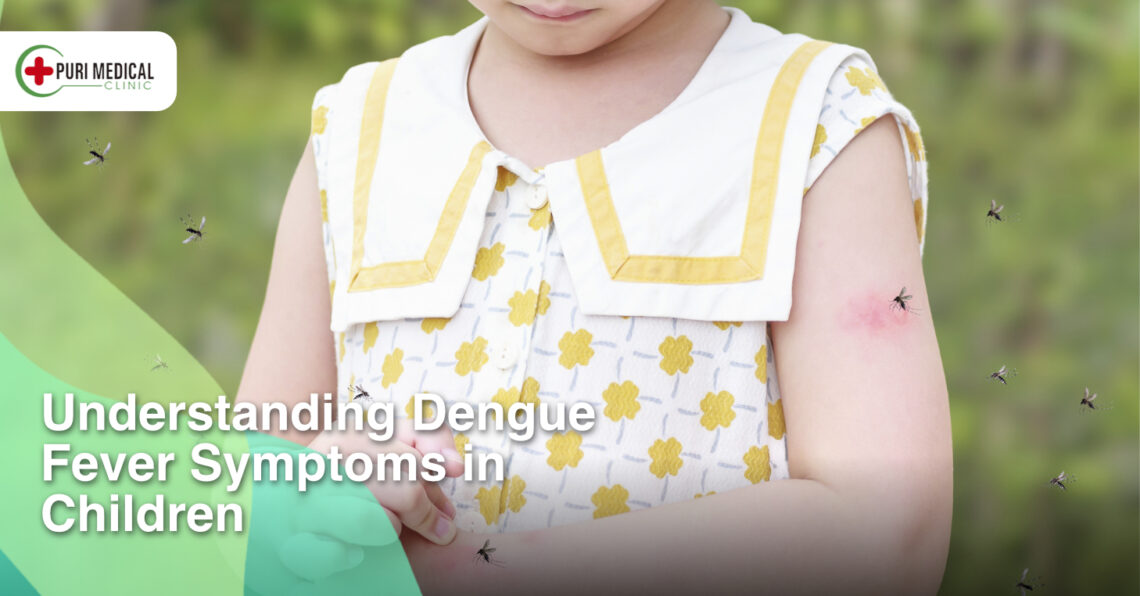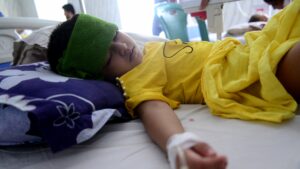
Dengue fever, or fracture fever, is a viral disease transmitted through the bite of an infected Aedes mosquito. It is a significant health problem, especially in tropical and subtropical areas. Children especially are more susceptible to dengue fever due to various factors. In this article, we will discuss what dengue fever is, the symptoms in children, and why children are more susceptible to dengue fever.

What is Dengue Fever?
Dengue fever is an acute viral illness characterized by flu-like symptoms such as high fever, severe headache, joint and muscle pain, rash, and swollen lymph nodes. The disease can range from mild to severe and can lead to dengue hemorrhagic fever or dengue shock syndrome, which can be life-threatening.
Why Are Children More Vulnerable to Dengue Fever?
Children are more susceptible to dengue fever due to several factors. First, their immune systems are not fully developed, making them less able to fight off the virus. Second, children tend to spend more time outdoors, increasing their exposure to mosquitoes. Additionally, they may not take adequate precautions to protect themselves from mosquito bites, such as using mosquito repellents or wearing protective clothing.
read more article Whooping Cough Symptoms: Recognizing the Signs
Dengue Fever Symptoms in Children
Children with dengue fever may exhibit similar symptoms to adults, but there are a few distinctive signs to watch out for. Younger children may have a higher fever, which can last for several days. Other common symptoms include:
- Severe headache: Children may complain of intense headaches, often accompanied by pain behind the eyes.
- Joint and muscle pain: Children may experience pain in their joints, muscles, and bones, making it difficult for them to move or walk.
- Rash: A characteristic rash may appear on the skin, typically starting on the face and then spreading to other parts of the body.
- Nausea and vomiting: Children may experience digestive issues such as nausea, vomiting, and abdominal pain.
- Bleeding: In some cases, children may have bleeding gums, nosebleeds, or blood in their urine.
Habitat of Dengue Mosquitoes
Aedes mosquitoes, the primary carriers of the dengue virus, thrive in urban and suburban areas. They lay their eggs in stagnant water sources, such as flower vases, discarded tires, and uncovered water containers. It is crucial to eliminate these breeding sites to reduce mosquito populations and prevent the spread of dengue fever.
First Aid and Treatment for Dengue Fever in Children
If you suspect that your child has dengue fever, seek medical attention immediately. While there is no specific antiviral treatment for dengue fever, medical professionals can provide supportive care to manage symptoms and prevent complications. The following first aid measures can be taken:
- Ensure rest and hydration: Encourage your child to rest and drink plenty of fluids to prevent dehydration.
- Monitor temperature: Keep track of your child’s temperature and provide appropriate fever-reducing medication as recommended by a healthcare professional.
- Avoid aspirin: Do not give aspirin to children with dengue fever, as it can increase the risk of bleeding.
In severe cases, hospitalization may be required to closely monitor the child’s condition and provide necessary medical interventions.
What to do if Your Children May Have Dengue Fever?
Dengue fever poses a significant threat to children, particularly in regions where the Aedes mosquito thrives. Understanding the symptoms, causes, preventive measures, and appropriate treatment is crucial for safeguarding children against this viral illness. By adopting preventive measures, being vigilant for symptoms, and seeking prompt medical attention, we can protect our children from the dangers of dengue fever.
Nonetheless, it is always advisable to consult a doctor and obtain a proper diagnosis for symptoms. The doctor will order a blood test to check for the presence of the virus or antibodies. You will be provided with a prescription suitable for alleviating symptoms. If your child experiences a deterioration in condition within the first 24 hours after the fever subsides, it is crucial to seek immediate medical attention at a clinic or hospital to assess for potential complications.
Ensure that you have a list of 24-hour healthcare facilities in your vicinity while in Bali. Remember that Puri Medical is available round the clock to cater to all your medical needs, including those of your children.








